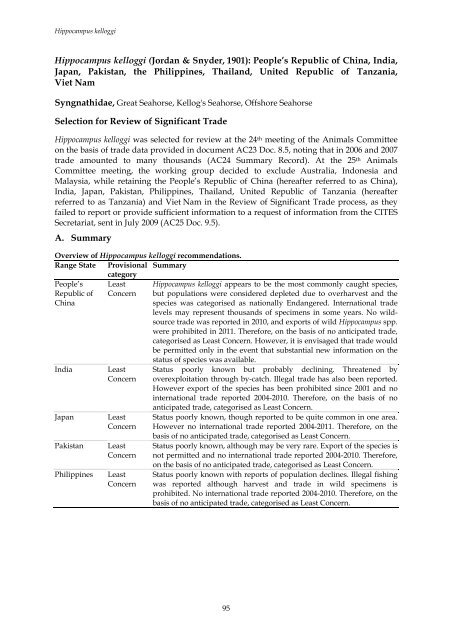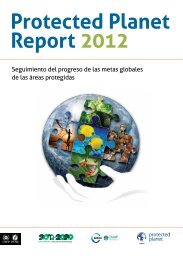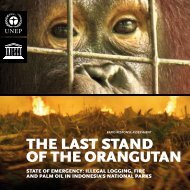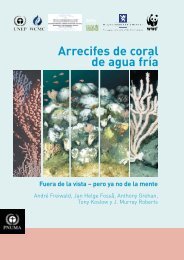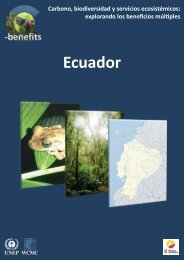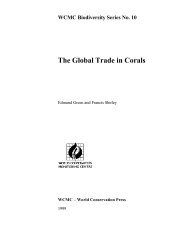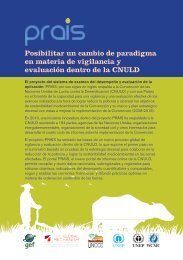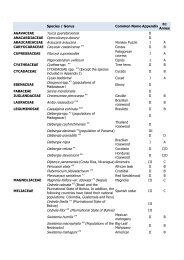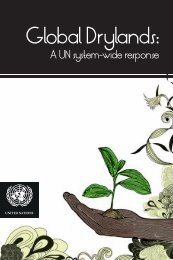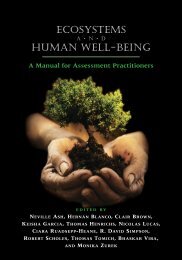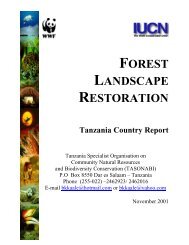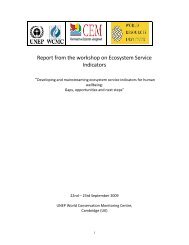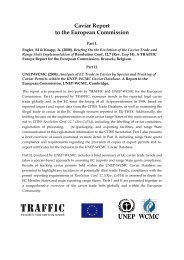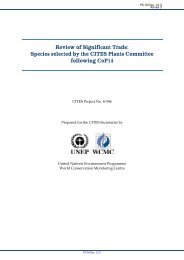2012. Review of Significant Trade - Cites
2012. Review of Significant Trade - Cites
2012. Review of Significant Trade - Cites
Create successful ePaper yourself
Turn your PDF publications into a flip-book with our unique Google optimized e-Paper software.
Hippocampus kelloggi<br />
Hippocampus kelloggi (Jordan & Snyder, 1901): People’s Republic <strong>of</strong> China, India,<br />
Japan, Pakistan, the Philippines, Thailand, United Republic <strong>of</strong> Tanzania,<br />
Viet Nam<br />
Syngnathidae, Great Seahorse, Kellog's Seahorse, Offshore Seahorse<br />
Selection for <strong>Review</strong> <strong>of</strong> <strong>Significant</strong> <strong>Trade</strong><br />
Hippocampus kelloggi was selected for review at the 24 th meeting <strong>of</strong> the Animals Committee<br />
on the basis <strong>of</strong> trade data provided in document AC23 Doc. 8.5, noting that in 2006 and 2007<br />
trade amounted to many thousands (AC24 Summary Record). At the 25 th Animals<br />
Committee meeting, the working group decided to exclude Australia, Indonesia and<br />
Malaysia, while retaining the People’s Republic <strong>of</strong> China (hereafter referred to as China),<br />
India, Japan, Pakistan, Philippines, Thailand, United Republic <strong>of</strong> Tanzania (hereafter<br />
referred to as Tanzania) and Viet Nam in the <strong>Review</strong> <strong>of</strong> <strong>Significant</strong> <strong>Trade</strong> process, as they<br />
failed to report or provide sufficient information to a request <strong>of</strong> information from the CITES<br />
Secretariat, sent in July 2009 (AC25 Doc. 9.5).<br />
A. Summary<br />
Overview <strong>of</strong> Hippocampus kelloggi recommendations.<br />
Range State Provisional Summary<br />
category<br />
People’s<br />
Republic <strong>of</strong><br />
China<br />
Least<br />
Concern<br />
Hippocampus kelloggi appears to be the most commonly caught species,<br />
but populations were considered depleted due to overharvest and the<br />
species was categorised as nationally Endangered. International trade<br />
levels may represent thousands <strong>of</strong> specimens in some years. No wildsource<br />
trade was reported in 2010, and exports <strong>of</strong> wild Hippocampus spp.<br />
were prohibited in 2011. Therefore, on the basis <strong>of</strong> no anticipated trade,<br />
categorised as Least Concern. However, it is envisaged that trade would<br />
be permitted only in the event that substantial new information on the<br />
status <strong>of</strong> species was available.<br />
India<br />
Japan<br />
Pakistan<br />
Philippines<br />
Least<br />
Concern<br />
Least<br />
Concern<br />
Least<br />
Concern<br />
Least<br />
Concern<br />
Status poorly known but probably declining. Threatened by<br />
overexploitation through by-catch. Illegal trade has also been reported.<br />
However export <strong>of</strong> the species has been prohibited since 2001 and no<br />
international trade reported 2004-2010. Therefore, on the basis <strong>of</strong> no<br />
anticipated trade, categorised as Least Concern.<br />
Status poorly known, though reported to be quite common in one area.<br />
However no international trade reported 2004-2011. Therefore, on the<br />
basis <strong>of</strong> no anticipated trade, categorised as Least Concern.<br />
Status poorly known, although may be very rare. Export <strong>of</strong> the species is<br />
not permitted and no international trade reported 2004-2010. Therefore,<br />
on the basis <strong>of</strong> no anticipated trade, categorised as Least Concern.<br />
Status poorly known with reports <strong>of</strong> population declines. Illegal fishing<br />
was reported although harvest and trade in wild specimens is<br />
prohibited. No international trade reported 2004-2010. Therefore, on the<br />
basis <strong>of</strong> no anticipated trade, categorised as Least Concern.<br />
95


